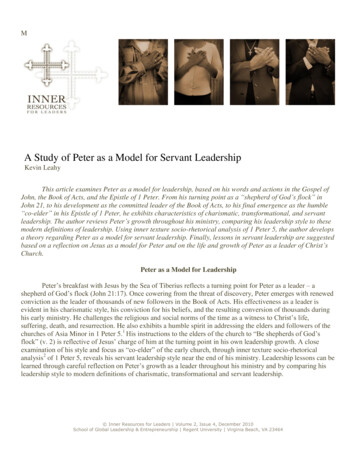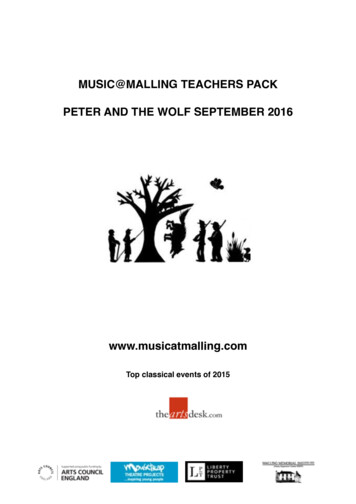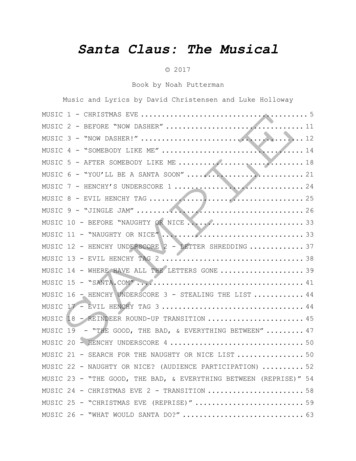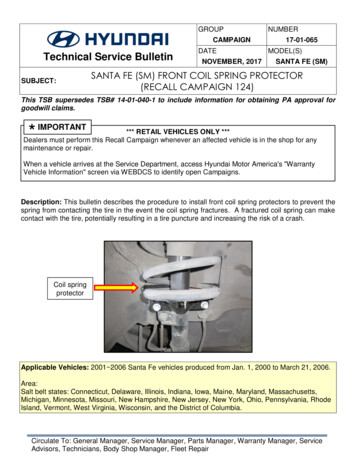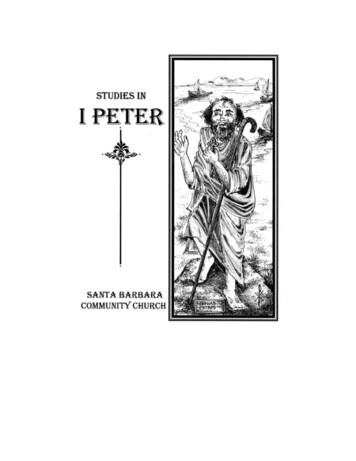
Transcription
Winter CalendarTeaching Date1/231/302/62/132/202/273/63/133/203/ :1-5New Birth Living Hope1:6-12The Joy of New Birth1:13-16Holy LivingNo Study: Bob Bakke teaching1:17-25Living as Strangers Part 12:1-10Living as Strangers Part 22:11-25Life Among the Pagans3:1-7Husbands and Wives3:8-22Silencing the Critics4:1-6Our Attitude Toward SinNo Study: Easter Sunday4:7-11Our Attitude Toward Fellow Believers4:12-19Don’t Be Surprised by SufferingNo Study: Church Retreat5:1-13Humility and LeadershipThe artwork for this study was provided by Linnie Avila. The text was written bySteve Jolley. Many thanks to proof-readers Joan Fredrickson and KristaFrohling.
Sources / AbbreviationsBlumEdwin Blum, The Expositors Bible Commentary, 1 Peter,Zondervan, 1981.CedarPaul Cedar, The Communicator’s Commentary, Word, 1984.ClowneyEdmund Clowney, The Message of 1 Peter, Inter VarsityPress, 1988.ESVEnglish Standard VersionKistemaker Simon Kistemaker, New Testament Commentary, BakerBook House, 1987.KJBKing James BibleLutherMartin Luther, Commentary on the Epistles of Peter andJude, Kregel Publications. 1982.McArthurJohn McArthur, The McArthur New Testament Commentary 1Peter, Moody, 2004.McKnightScot McKnight, The NIV Application Commentary,Zondervan, 1996.NIVNew International VersionRSVRevised Standard VersionStibbsAlan Stibbs, The First Epistle General of Peter, EerdmansPublishing, 1959.WiersbeWarren Wiersbe, Be Hopeful, Victor, 1982.All Scripture passages are taken from the New International Versionunless otherwise noted.
INTRODUCTIONIntroductionPeter. His original name in Hebrew was Simeon. James refers to him with thisname at the Jerusalem Council (Acts 15:14). His Greek name, Simon, is howPeter is referred to forty-nine times in the New Testament. Cephas is his thirdname and is the Aramaic word for rock, which is the same as the Greek word forrock, Petros. What sort of man was this Peter?He was just an ordinary guy, a working man, a fisherman to be precise.No distinguished family name—all we know for sure is that his father wascalled John. Not a lot of money and not much in the way of formaleducation, it seems. Like all “ordinary people” he had his particularstrengths and he had his share of human weakness. His life revolvedaround the family business, the sea, the wife, the mother-in-law—youknow the kind of story. (David Gill, Peter the Rock, p. 13)Jesus selected twelve disciples to travel with him and learn about his Kingdom.With his brother Andrew, who was also one of the twelve disciples, Peter was tospend the better part of three years with Jesus. Along with James and John,Peter rose to a place of leadership and prominence among this traveling band ofbrothers. Peter was with Jesus at the transfiguration (Matthew 17). He was thefirst to recognize and proclaim that this rabbi Jesus was in fact the long awaitedMessiah (Matthew 16). This impetuous disciple was the only one to try his abilityat walking on water (Matthew 14). He was not above violence. At the arrest ofJesus it was Peter who drew a sword and took off the ear (he missed his target)of Malchus in an attempt to protect his Lord (John 18:10). Yet, only hours later,this previously brave disciple denies Jesus three times to those who question him(Matthew 26).After Peter’s failure Jesus reinstated him giving him a special commission (John21). Peter was to preach the first sermon after the death and resurrection ofJesus. The Holy Spirit used Peter’s words and the book of Acts tells us thatthree thousand people believed in Jesus that day (Acts 2). The Church of JesusChrist was born. Peter goes on to become the dominant figure in the first half ofthe book of Acts. It was this disciple who healed (Acts 3), spent time in prison(Acts 4), took the gospel to the Samaritans (Acts 8) and played a pivotal role inthe Jerusalem Council (Acts 15).Not much is known about Peter’s later life. The focus of the book of Acts shifts tothe apostle Paul. When Peter was released from prison he, left for another place(Acts 12:17). He may have traveled in Asia Minor ministering to God’s elect,strangers in the world, scattered throughout Pontus, Galatia, Cappadocia, Asia,and Bithynia (1 Peter 1:1). Peter eventually settled in Rome where he wascrucified for following Jesus.STUDIES IN 1 PETERPAGE 1
INTRODUCTIONBoth 1 & 2 Peter are a part of the New Testament letters referred to as the“catholic” (universal) or “general epistles” (James, 1 & 2 Peter, 1, 2 and 3 John,and Jude). These letters are grouped together because they are not addressedto a specific location such as Paul’s letter to the Christians at Rome. Since theseepistles lack a specific audience they are named after their authors.In reading 1Peter it quickly becomes apparent that the apostle’s tone is warmand pastoral. The letter is full of encouragement for Christians who are sufferingpersecution and hardship. Peter is giving practical guidance for these believerswho are trying to figure out how to live for God in the midst of a pagan culturethat is hostile to their faith. While the letter is not a theological treatise, likePaul’s letter to the Romans, it is full of valuable theological insights.Peter highlights the sufferings of Jesus and his subsequent messianic glory.Since Jesus suffered and was then glorified the followers of Jesus can alsoexpect to suffer and look forward to future glory and reward. This is a comfortingpicture for believers who are experiencing hatred and persecution. The wordsuffer is found twelve times in this brief letter. Peter wants his readers to realizethat the sovereign Lord will sustain them in the midst of adversity and lift themup to a position of honor and glory in the future.Some commentators speculate that Peter may have been living in Rome(Babylon of 5:13) during the reign of Nero (A.D. 54-68). In his madness Neroburned two thirds of Rome and then blamed it on the Christians. The result wasan ever widening and hostile persecution of this young church in much of theRoman world.Peter is the disciple that the New Testament presents in all his strengths andweakness. While the apostle Paul impresses us with his discipline, brilliance,and missionary tenacity, many Christians have a hard time relating to this giant ofthe New Testament. His penning of thirteen New Testament letters, threelengthy and costly missionary trips can seem super human and beyond the abilityof the ordinary Christian. We love Peter, however, because we can identity withhim. He puts his foot in his mouth, he stumbles, and he gets mad. In short, he isso very human! We find in him comfort for our own failures and, in his success,hope for our own advancement in discipleship.PAGE 2STUDIES IN 1 PETER
NEW BIRTH LIVING HOPEStudy OneNew Birth Living Hope1 Peter 1:1-5As we begin our study of 1 Petertry to picture yourself in theposition of Peter’s readers. Youare strangers in the world who arescattered throughout Pontus,Galatia, Cappadocia, Asia andBithynia.1 In short order Peter willremind these believers to not besurprised by the painful trial youare suffering. (4:12) Not exactlycomforting words. In the weeksahead we will come to understandmore fully what it is to suffer for thesake of Christ. Peter begins hispastoral letter of encouragement tosuffering Christians by remindingthem of their new identity in Christ.In this brief epistle, the apostlewastes no time in providing acondensed resume of the Christian faith.1 Peter is a short, truth-laden letter to everyday Christians. As we embark on ourtwelve-week study of this remarkable New Testament book, take the time to readthe letter in its entirety in one sitting. What themes do you notice? Are there anyparticular words or concepts that stand out? Take a stab at summarizing thebroad thrust of Peter’s words in these five chapters. Be ready to share youropening impressions with your Homegroup.1Pontus, Galatia, Cappadocia, Asia, and Bithynia are the names of Roman provinces that covera large part of Asia Minor. Most of modern day Turkey would be included. Most likely some ofthe large Jewish population of this part of the world heard Peter’s sermon at Pentecost inJerusalem and returned to these provinces spreading the gospel.STUDIES IN 1 PETERPAGE 3
NEW BIRTH LIVING HOPEPeter begins by identifying himself as an apostle of Jesus Christ. Think throughsome of Peter’s failures as a disciple and Jesus’ reinstatement of him. How is itthat Peter has now come to proudly wear this title of distinction, apostle of JesusChrist? Matthew 26:31-35 Matthew 26:69-75 John 21:15-19In 1 Peter 1:1-5, the author describes the Christian’s new birth. He begins byemphatically pointing out that the miracle of salvation begins with God. Salvationis God’s initiative. To God’s elect . . .( vs. 1) The Bible frequently teaches thatour salvation is due to a sovereign God electing or choosing people to be saved.This doesn’t sit well with many people. After all, we like to believe that we aremasters of our own destiny and that we choose to follow God. Ours is an erathat feeds on the belief of the freedom of the individual. If it seems startling toyou for Peter to begin his letter with this teaching, consider how Paul beginssome of his letters. What are the similarities and differences between Peter andPaul’s introductions? Ephesians 1:1-5 Titus 1:1-2The fact that God has chosen us is so central to Peter’s understanding of newspiritual birth that he mentions it again in 2:9, You are a chosen race. Thisbiblical teaching of “election” or God’s choosing of us is found throughout theScriptures. Ponder the texts below and write down a few of your thoughtsconcerning this wonderful and perplexing teaching. What do you make of thisteaching on “election”?PAGE 4 Romans 8:29-30 Ephesians 1:11STUDIES IN 1 PETER
NEW BIRTH LIVING HOPE Colossians 3:12 2 Thessalonians 2:13Jesus himself was quite clear concerning the sovereignty of God in callingindividuals to himself to be born again spiritually. Consider the words of Jesus.How do they help your understanding of God’s choosing people to be saved? Matthew 24:22 John 6:44 John 13:18 John 15:16If you are wondering about your part in choosing to follow Jesus rest assured thatthe New Testament writers also affirm the truth that every man and woman whocomes to God must exercise their will. Consider the following Scriptures in lightof those we have already looked at. Matthew 23:37 John 3:16 John 7:17-18 Acts 2:37-38Charles Spurgeon, the famous 19th century London preacher, was once askedhow he reconciled the Bible’s teaching on God’s sovereign election and ourfreedom to choose to follow God. Spurgeon responded, “I never reconcileSTUDIES IN 1 PETERPAGE 5
NEW BIRTH LIVING HOPEfriends.” How do you understand and apply these two sets of Scriptures we haveconsidered?1Peter is writing to, God’s elect, strangers in the world, scattered throughout . . .The word “scattered” comes from the Greek word diaspora, which is where weget the English word dispersion. The “diaspora” became a common term thatreferred to the scattering of the Jews after their forced deportation by theAssyrians in 722 BC and exile from Jerusalem, under the Babylonians, in 587BC. How would these opening 5 verses of Peter’s letter be of encouragement topeople who were scattered and strangers? How are they an encouragement toyou?Peter now goes on in verse 2 to clarify the scope of this new spiritual birth inJesus Christ. According to verse 2, how are we chosen? You should find atleast three ways that God’s activity is involved in his saving us. How does thishelp you understand your new birth?1.2.3.1Theologian J.I. Packer has written an excellent book that struggles with these two biblicalteachings. “All Christians believe in divine sovereignty, but some are not aware that they do, andmistakenly imagine and insist that they reject it. What causes this odd state of affairs? The rootcause is the same as in most cases of error in the Church—the intruding of rationalisticspeculations, the passion for systematic consistency, a reluctance to recognize the existence ofmystery and let God be wiser than men, and a consequent subjecting of Scripture to thesupposed demands of human logic. People see the Bible teaches man’s responsibility for hisactions; they do not see (man, indeed, cannot see) how this is consistent with the sovereignLordship of God over those actions. They are not content to let the two truths live side by side, asthey do in the Scriptures, but to jump to the conclusion that, in order to uphold the biblical truth ofhuman responsibility, they are bound to reject the equally biblical and equally true doctrine ofdivine sovereignty, and to explain away the great number of texts that teach it. The desire toover-simplify the Bible by cutting out the mysteries is natural to our perverse minds, and it is notsurprising that even godly men should fall victim to it.” (J.I. Packer, Evangelism and theSovereignty of God, 1961, pp.16-17)PAGE 6STUDIES IN 1 PETER
NEW BIRTH LIVING HOPEWhat is foreknowledge? Simon Kistemaker gives us some help in understandingthis term.It is much more than the ability to predict future events. It includes theabsolute sovereignty of God in determining and implementing his decisionto save sinful man. The word foreknowledge appears in Peter’s Pentecostsermon, where he declares to his Jewish audience that Jesus was“handed over to you by God’s set purpose and foreknowledge.” (Acts2:23) Peter implies that God worked according to his sovereign plan andpurpose which he made in advance. Paul also refers to foreknowledge.The verb foreknow occurs in Romans 8:29, “For those God foreknew healso predestined to be conformed to the likeness of his Son.” Paulindicates that the concepts of foreknowledge and predestination gotogether. Foreknowledge and predestination were acts of God before thecreation of the world. (Kistemaker, p. 35)Read 2 Thessalonians 2:13-14. What role does the Spirit of God play in oursalvation? How have you experienced the presence of the Holy Spirit in your lifesince you have become a Christian?When Peter mentions sprinkling by his blood he undoubtedly has in mind Exodus24:3-8. How does this Old Testament story help you understand this verse?Before moving on, identify each member of the trinity—Father, Son, Holy Spirit—in these opening two verses. Do you normally think of your salvation as a workof the trinity? Why? Why not?STUDIES IN 1 PETERPAGE 7
NEW BIRTH LIVING HOPEWhat our English versions take five long sentences to translate (vs. 3-9) is reallyone long sentence in the Greek text. What may upset English teachers in Peter’sgrammar is a beautifully elegant doxology (praise) for what God has done for usin our salvation.1The picture of new birth is a metaphor describing our new spiritual life. Peter willgo on to use the same image in 1:23 where he says, For you have been bornagain. Jesus said much the same to a Pharisee named Nicodemus telling himhe must be, born again. (John 3:3) What do you like about this image of newspiritual life? How does it help in your understanding of salvation?What are the similarities between physical birth and spiritual birth?The term born again has become very popular in the media in recent years andis often used to describe Christians. You will hear commentators on TV refer to“born again Christians.” Are there any other type of Christians? Is it possible tobe a Christian and not be born again? Do you use this term to describe yourfaith to non-Christian friends?What hope is Peter referring to in verse 3? Think about your own salvation. Inwhat ways does your new birth result in a new hope? Don’t be too “spiritual”here! Get very practical and describe this hope in every day terms a nonChristian would understand.Would we have any hope without the resurrection of Jesus? Is it possible tohave a Christian faith without a resurrection?1Peter’s doxology in 1:3-9 is very similar to Paul’s run-on sentence in Ephesians 1:3-14. If youwant to go deeper in this study compare words and themes in these two lengthy sentences.What are the similarities? Do you notice any differences?PAGE 8STUDIES IN 1 PETER
NEW BIRTH LIVING HOPEWhen a parent dies many people end up with some kind of inheritance. Here inverse 4 Peter refers to our spiritual inheritance. The concept of inheritance in theBible is a rich one and the word is found often. If you want extra-credit for thisstudy, read these verses that speak of our inheritance. Impress your Homegroupby summarizing what you learned. Romans 8:17 Galatians 4:7 Ephesians 1:13-14 Titus 3:7 Hebrews 9:15In verse 4, Peter tells us three ways that our heavenly inheritance is differentfrom any earthly inheritance we may receive. How are they different? Whatdoes this mean to you and your future?1.2.3.Peter’s readers are scattered, strangers and suffering for their faith. How doesPeter assure them that this inheritance is secure?End your Homegroup by sharing how this hope we have in Christ is shaping yourday-to-day living now.STUDIES IN 1 PETERPAGE 9
PAGE 10STUDIES IN 1 PETER
NEW BIRTH JOYStudy TwoNew Birth Joy!1 Peter 1:6-12In 1 Peter 1:6-12, Peter is reminding hisreaders that their new spiritual birthchanges everything. Peter began hisletter with an affirmation that being bornagain results in a living hope because ofGod’s initiative on our behalf. In this longrun-on sentence (vs. 3-9 are onesentence in the Greek text) Peter nowgoes on to point out that this new birth isaccompanied by an inexpressible andglorious joy. (vs. 8) Salvation and joybelong together. When the believerbecomes fully aware of the gift of eternalsalvation, it is expressed in a rejoicingand joy regardless of earthlycircumstances. The Old Testamentprophet Isaiah said much the same thing.And the ransomed of the Lord willreturn and come with joyfulshouting to Zion, with everlastingjoy upon their heads. They willfind gladness and joy, and sorrowand sighing will flee away. (Isaiah 35:10)Peter’s readers were facing severe persecution. In the weeks ahead as we studythis epistle we will see this theme come up frequently. It is against this backdropof a suffering church that Peter seeks to encourage the believers, writing of thesalvation joy that is an essential part of being a Christian.While the focus of our study is verses 6-12, start at the beginning of the chapterand read 1:1-12 again. Try reading it in more than one translation. Keep in mindas you read that the people who first read these words were having a tough go ofit. Life was not easy and suffering, persecution and hardship was a definitivepart of their everyday experience.STUDIES IN 1 PETERPAGE 11
NEW BIRTH JOYVerse 6 says, In this you greatly rejoice . . . What are the words in this referringto? Why would this cause rejoicing?Peter comes back to this theme of joy a few verses later when he says thebeliever is, filled with an inexpressible and glorious joy . . . (vs. 8) According toverse 9 why should the Christian’s life be characterized by this joy?Think about the things that bring you joy in life. For just a moment leave Godand our spiritual blessings out of your thoughts. List a handful of ingredients inyour life that bring you pleasure and joy.Now think about your eternal salvation. How does it bring joy into your life? Howdoes your salvation and the living hope we have in Christ affect the joy you findin the more temporal and common things of life?Peter says this joy is inexpressible. The Greek word (aneklateto) literally meansto be higher than speech. In other words, salvation joy is at one level beyondcommunication. In spite of this it is only natural to search for words. It is typicalof a lover to say his love is beyond words and then write a lengthy poem trying todescribe this love. Christian devotional literature (especially the mystics) is full ofauthors who have had an ineffable experience of joy with Christ and then spareno effort trying to explain what they deem essentially inexpressible! Go aheadand give it a try. How would you describe the joy that you have in yoursalvation? Describe and give expression to this inexpressible and glorious joy.Consider and respond to Simon Kistemaker’s and John MacArthur’s thoughts onthe joy Peter is talking about.What is joy? Joy is not an emotional outburst that lasts momentarily. It isnot simply a response to external circumstances that favor and encouragePAGE 12STUDIES IN 1 PETER
NEW BIRTH JOYexpressions of joy. Joy often appears in the midst of hardship, suffering,trials, and persecutions. Joy is a gift that we receive from God, forScripture shows that God is the giver of joy. This gift, then, comes to thebeliever who puts his complete trust in God. (Kistemaker, p. 51)Salvation joy is not some brief, shallow, circumstantial emotion, but rathersomething permanent and profound, tied closely to the spiritual blessingsof faith, hope, and love and given by God through His Son and the HolySpirit. Mere happiness comes from positive external events, but salvationjoy results from the deep-rooted confidence that one possesses eternallife from the living God through the crucified and risen Christ . . .(MacArthur, p. 40)What other Scriptures do you know of which speak of the joy the believer has insalvation and knowing God? Be ready to read some of these verses to yourgroup.The Westminster Catechism asks the question,1 What is man’s chief end? Itanswers: Man’s chief end is to glorify God and enjoy him forever. Why is theenjoyment of God so important to the Christian life? Why do you think Peter isso concerned that his readers understand the role of joy in the Christian life?Before moving on in our text for this study think about your own life. Are youexperiencing an inexpressible joy in your spiritual life? Why? Why not?Augustine, the 4th century pastor and theologian from North Africa, wasacquainted with inconsistency in his experience of joy. How do you resonatewith his ruminations below?I was astonished that although I now loved you . . . I did not persist inenjoyment of my God. Your beauty drew me to you, but soon I wasdragged away from you by my own weight and in dismay I plunged again1Catechism comes from the Greek word katecheo, which means to teach or instruct. It wasduring the 16th century Reformation that churches began to take members through a setcatechism of instruction, often in preparation for baptism. In 1647 the most famous of theReformed catechisms took shape, the Westminster Larger and Shorter Catechism.STUDIES IN 1 PETERPAGE 13
NEW BIRTH JOYinto the things of this world . . . as though I had sensed the fragrance ofthe fare but was not yet able to eat it. (Quoted in John Piper, When IDon’t Desire God, p. 14)At the heart of this letter is Peter’s concern for Christians who are facing grief inall kinds of trials. (vs. 6) He reminds his readers that their sufferings are only for alittle while (more literally would be for a season). Read the verses below. Howdo they give perspective to the believer who is suffering? Grapple especially with2 Corinthians 4:17 where Paul calls our sufferings, light and momentary troubles.How can Paul say this? Psalm 30:5 Isaiah 54:7-8 Romans 8:18 2 Corinthians 4:17After our discussion of joy it would be a mistake to think that Peter takes the painand suffering of believers lightly. Nothing could be further from the truth. Thegrief Peter refers to is real (NASB translates this as distressed). Respond to thisobservation by commentator Warren Wiersbe.Peter did not suggest that we take a careless attitude toward trials,because this would be deceitful. Trials produce what he called“heaviness.” The word means to “experience grief or pain.” It is used todescribe our Lord in Gethsemane (Matt. 26:37), and the sorrow of saintsat the death of loved ones. (1 Thes. 4:13) To deny that our trials arepainful is to make them even worse. Christians must accept the fact thatthere are difficult experiences in life and not put on a brave front just toappear “more spiritual.” (Wiersbe, p. 24)PAGE 14STUDIES IN 1 PETER
NEW BIRTH JOYVerse 7 explains, at least in part, why believers suffer through trials. Whatpositive purpose do trials have in the Christian’s life? How does the illustration ofgold being refined by fire help you understand these trials?Verses 10-12 tie the Old Testament and the New Testament together. The greatsalvation, that Peter has spoken of in vs. 3-9, was predicted by the OldTestament prophets. If you find yourself amazed at the scope of God’s provisionfor salvation, you are in good company. It appears that the prophets themselveshad to study their own words to figure out what God was up to! Even the angelsare astonished and maybe a bit perplexed by God’s plan.1 Consider EdwinBlum’s comment.Through revelation the prophets learned that some of their utterancesrelated to future generations. The writings of the prophets contain both“near” and “far” aspects. Yet the prophets were unable to understand thetime significance of their prophecies or to understand fully the relation ofthe sufferings of the Messiah to his glory. (Blum, p. 222)Read 2 Peter 1:20-21. How does this help in your understanding of our passagein 1 Peter 1:10-12?Having spent some time in individual study and group discussion of 1 Peter 1:612 what part of the text has impacted you the most? Which part of this study willyou apply to your life this week? Be ready to share with your group how you willimplement what you have learned.1Could it be that God is educating the angels by what he is doing in the church? (1 Corinthians4:9, Ephesians 3:10)STUDIES IN 1 PETERPAGE 15
PAGE 16STUDIES IN 1 PETER
CALLED TO BE DIFFERENTStudy ThreeCalled To Be Different1 Peter 1:13-16When was the last time you had aconversation with a fellow believer whereyou encouraged each other to holy living? Ithas probably been awhile. Holy living is asubject that is easy to avoid. We tend tobecome uncomfortable with the idea. Unbiblical caricatures of a “holy life” may floodour minds and when we are really honest itjust is not that attractive! It is much easier totalk about God’s holiness or to sing thehymn, “Holy, Holy, Holy, Lord God Almighty.”After pondering God’s choosing of us forsalvation through the miracle of new birth,Peter now begins to lay out a plan foractually living a new life based on this newbirth. The goal is a lifestyle that ischaracterized by holiness. Nineteenthcentury preacher Charles Spurgeon said,“Holiness is the architectural plan uponwhich God buildeth up His living temple.”Before reading the text, write down some ofyour thoughts, pre-conceived ideas, stereo—types and impressions about what “holyliving” looks like. Have some fun sharingthese in your group.Read 1 Peter 1:13-16. While it will take some work to discern the implications ofthis text, Peter’s position in these four short verses is very clear. WarrenWiersbe gives us a succinct summary.STUDIES IN 1 PETERPAGE 17
CALLED TO BE DIFFERENTThe argument here is logical and simple. Children inherit the nature oftheir parents. God is holy; therefore, as his children, we should live holylives. We are “partakers of the divine nature” (2 Peter 1:4) and ought toreveal that nature in godly living. (Wiersbe, p. 33)The grammatical syntax of this passage is important. Peter began his letterusing the indicative mood explaining the nature of the Christian’s faith in verses3-12. Peter essentially said, “This is what God did for you . . .” Now Peterchanges his tone of voice and begins to command and urge (imperative mood)his readers to live a new life based on their new spiritual position. Therefore (vs.13) is an important word because it reminds us that this call to holiness is basedon God’s concrete action on our behalf.In verse 13 Peter gives three rapid-fire commands for this new life. What arethey?1.2.3.The first admonition, prepare your minds for action presents us with an imagethat is often lost in our English translations. The NKJV gives a more literalwording from the Greek text, Gird up the loins of your mind. The metaphor canbe a little confusing at first glance. What we are to picture is a first-centuryperson who would pull a long flowing garment between his legs and either tiethem off around his waist or tuck them into a belt. The point was so as not to behindered in walking, running, working or battle. Peter then applies this image toour mind. Commentators note that a modern equivalent would be somethinglike, “rolling up the shirt-sleeves of your mind,” or “taking off the coat of yourmind.” (McKnight, p. 84)How do you take the initiative in preparing your mind for a life of holiness? Bepractical. How does how we think affect how we act? What can we do to thinkcorrectly?How do the verses below help? Romans 12:2 2 Corinthians 10:4-5 1 Peter 5:8PAGE 18STUDIES IN 1 PETER
CALLED TO BE DIFFERENTThe second command, be self-controlled is translated in the NASB as keepsober in spirit. The original meaning of this word was related to abstaining fromthe excessive use of wine. In the New Testament the word is used often with aview to having sound judgment as a believer in all areas of life. Consider JohnMacArthur’s comments.Metaphorically it means not to loose spiritual control by imbibing theworld’s sinful system. It connotes the entire realm of spiritualsteadfastness or self-control: having clarity of mind and discipline of heart,being in charge of one’s priorities and balancing one’s life so as not to besubject to the controlling and corrupting influence of the flesh’sallurements. (MacArthur, p. 65)Peter will re-emphasize this self-control again in 1 Peter 5:8. How have you seenself-control help in your quest to live a holy life? If you are brave and it isappropriate, share with your group an area where a lack of self-control hinderedyour spiritual life.The third command in verse 13 concerns living life now in lig
the apostle Paul. When Peter was released from prison he, left for another place (Acts 12:17). He may have traveled in Asia Minor ministering to God’s elect, strangers in the world, scattered throughout Pontus, Galatia, Cappadocia, Asia, and Bithynia (1 Peter 1:1). Peter eventually se
